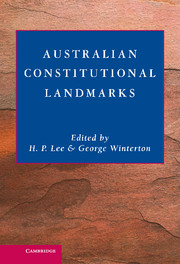Book contents
- Frontmatter
- Contents
- List of Cases
- List of Commonwealth Constitution Provisions
- List of Statutes
- List of Contributors
- Preface
- Introduction: The Commonwealth's Constitutional Century
- 1 The Emergence of the Commonwealth Constitution
- 2 The Engineers Case
- 3 The Uniform Income Tax Cases
- 4 The Bank Nationalisation Cases: The Defeat of Labor's Most Controversial Economic Initiative
- 5 The Communist Party Case
- 6 Fitzpatrick and Browne: Imprisonment by a House of Parliament
- 7 The Boilermakers Case
- 8 The Race Power: A Constitutional Chimera
- 9 The Double Dissolution Cases
- 10 1975: The Dismissal of the Whitlam Government
- 11 The Tasmanian Dam Case
- 12 The Murphy Affair in Retrospect
- 13 The Privy Council and the Constitution
- 14 Cole v Whitfield: ‘Absolutely Free’ Trade?
- 15 The ‘Labour Relations Power’ in the Constitution and Public Sector Employees
- 16 The Implied Freedom of Political Communication
- Index
4 - The Bank Nationalisation Cases: The Defeat of Labor's Most Controversial Economic Initiative
Published online by Cambridge University Press: 07 October 2011
- Frontmatter
- Contents
- List of Cases
- List of Commonwealth Constitution Provisions
- List of Statutes
- List of Contributors
- Preface
- Introduction: The Commonwealth's Constitutional Century
- 1 The Emergence of the Commonwealth Constitution
- 2 The Engineers Case
- 3 The Uniform Income Tax Cases
- 4 The Bank Nationalisation Cases: The Defeat of Labor's Most Controversial Economic Initiative
- 5 The Communist Party Case
- 6 Fitzpatrick and Browne: Imprisonment by a House of Parliament
- 7 The Boilermakers Case
- 8 The Race Power: A Constitutional Chimera
- 9 The Double Dissolution Cases
- 10 1975: The Dismissal of the Whitlam Government
- 11 The Tasmanian Dam Case
- 12 The Murphy Affair in Retrospect
- 13 The Privy Council and the Constitution
- 14 Cole v Whitfield: ‘Absolutely Free’ Trade?
- 15 The ‘Labour Relations Power’ in the Constitution and Public Sector Employees
- 16 The Implied Freedom of Political Communication
- Index
Summary
When the High Court handed down its decision in Bank of New South Wales v Commonwealth on 11 August 1948 there was, somewhat unusually for a judicial determination, rejoicing in the streets of Australia's capital cities. Among the general populace few would have appreciated the complex constitutional reasons behind the Court's decision that the central provisions of the Commonwealth's Banking Act 1947 were invalid. Those provisions required the private banks in Australia to cease operations upon a declaration by the Commonwealth Treasurer and to transfer their assets and business to the Commonwealth Bank, ensuring to the latter a virtual monopoly over Australian banking. Whether they appreciated the subtleties of the decision or not, many employers, not least the private banks, gave employees a day off to celebrate. Newspapers whose editorials had fulminated for months against the Commonwealth's banking legislation poured forth paeans of praise. The jubilation extended beyond the banks themselves and their employees to company boardrooms, chambers of commerce and conservative political associations. The Right Honourable Robert Menzies KC, the leader of the recently reconstituted Liberal Party who had led the opposition to the legislation in the Commonwealth Parliament, proclaimed the decision as the triumph of the Constitution over the insidious and enervating socialist program of the Chifley Labor Government. For the Government it was a stunning defeat of one of its most controversial economic reforms.
- Type
- Chapter
- Information
- Australian Constitutional Landmarks , pp. 85 - 107Publisher: Cambridge University PressPrint publication year: 2003



